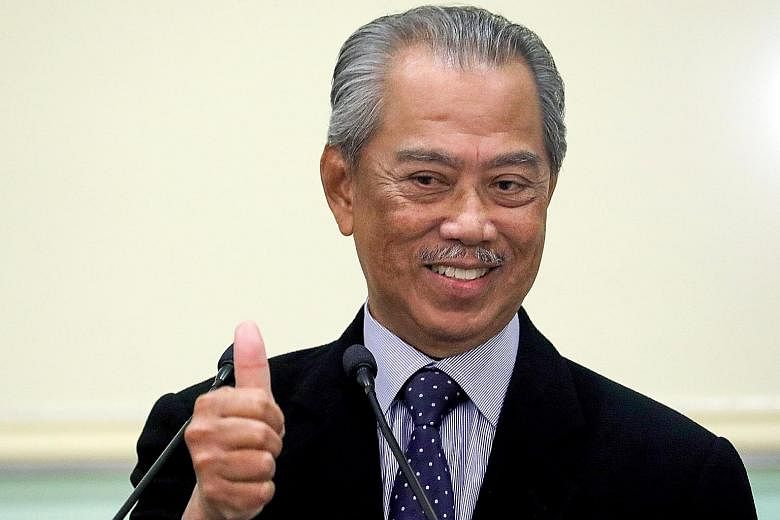Malaysia's move to cut short its partial shutdown by more than a week and allow nearly all economic activity to resume today is stirring a worrisome debate in the country.
There are concerns that Prime Minister Muhyiddin Yassin was forced to change tack on the widely applauded disease control measures due to political pushback from his coalition partners, a battered business elite and an increasingly restive Malay community.
The high-stakes move - which the Malaysian government said last Friday was crucial to resuscitate the domestic economy that was losing RM2.4 billion (S$800 million) daily and set to contract by as much as 8.5 per cent this year, based on estimates by Barclays - underscores the tightrope Tan Sri Muhyiddin must walk to remain in charge following his appointment to the premiership by Malaysia's King in early March.
"To get the economy going again and dealing with the pandemic at the same time will require getting so many things right when dealing with many complex issues like falling revenues, with the collapse of tourism and weak oil prices," said Mr Manu Bhaskaran from Centennial Asia Advisors in Singapore.
The prospect of things going wrong appeared high at the weekend when daily Covid-19 infection numbers, which had been falling over a long stretch, snapped back to triple-digit figures.
The Health Ministry reported 105 new cases last Saturday, bringing the total to 6,176, with 103 deaths and a recovery rate of 70 per cent.
On the economic front, the Muhyiddin administration must grapple with complications posed by highly indebted households and corporates.
The government must also confront challenges which are the result of the country's over-dependence on foreign labour, both legal and illegal, said to be in the region of at least 6.5 million among the country's 30 million population.
A recent Barclays report stated that Kuala Lumpur and its surrounding suburbs and towns, often referred to as the Klang Valley, was by far the hardest-hit city in terms of economic loss in Asia as a result of the movement control measures.
Next on the list were Manila, New Delhi and Mumbai. Barclays estimated the losses in these cities at between US$1 billion and US$1.7 billion (S$1.4 billion and S$2.4 billion) each week.
Malaysia's partial shutdown, which began on March 18 and was initially set to extend to May 12, came amid political upheaval.
Mr Muhyiddin, who was minister for home affairs under the Pakatan Harapan coalition government, led a defection of a large number of elected Parliamentary representatives, together with malcontents from other parties.
It resulted in the collapse of the administration led by Tun Dr Mahathir Mohamad.
Mr Muhyiddin's Parti Pribumi Bersatu Malaysia subsequently made a pact with the long-established Umno and Parti Islam SeMalaysia to form a new coalition government, now called Perikatan Nasional (PN).
The PN coalition has a razor-thin majority in the 222-member Parliament, leaving Mr Muhyiddin vulnerable when the Lower House convenes for its much-anticipated sitting in the third week of this month.
The initial criticism of Mr Muhyiddin was that he was using the health crisis to buy time to bolster his political support in Parliament.
After constituting an enlarged Cabinet to satisfy his coalition partners, the Premier has been dispensing positions in government-linked entities, particularly to Umno politicians, to win their support.
However, his hold over his PN coalition, particularly Umno, is tentative at best. Party president Ahmad Zahid Hamidi and former premier Najib Razak, who are both facing corruption charges but still widely considered the country's two top political power brokers, have been coy about their backing for Mr Muhyiddin.
Political analysts noted that unless Mr Muhyiddin secures some deal with the two leaders, his premiership will be hostage to the whims and fancies of Umno.
Malaysia's partial shutdown, which included sweeping limits on movements and a strictly imposed curfew, has been a blow to an already troubled economy bereft of growth drivers, hobbled by increases in the cost of living, as well as the multiple risks posed to the banking sector by the country's fragile property sector and heavily leveraged corporations.
Worst-hit has been the large pool of Malaysia's casual workforce, who depend on their daily takings from running small businesses, such as eateries, pop-up food stalls, auto workshops and other labour services.
This grouping cuts across races in Malaysia's multi-ethnic population but hits the dominant Malay community that makes up more than 60 per cent of the population very hard, particularly during the Muslim fasting month of Ramadan.
The movement controls have curtailed many of Ramadan's traditions, such as bazaars with stalls selling food and clothing that are an important source of revenue for many Malay families.
Political analysts noted that Mr Muhyiddin's move to lift the controls will buy him considerable support among large sections of the Malay community, and put his foes within Umno on the defensive for the short term. It will also dissuade his political opponents from staging any attempts to dislodge him.
They added that his administration is unlikely to win widespread legitimacy from Malaysians, but should his gambit to revive the economy work, he will secure their grudging respect.











